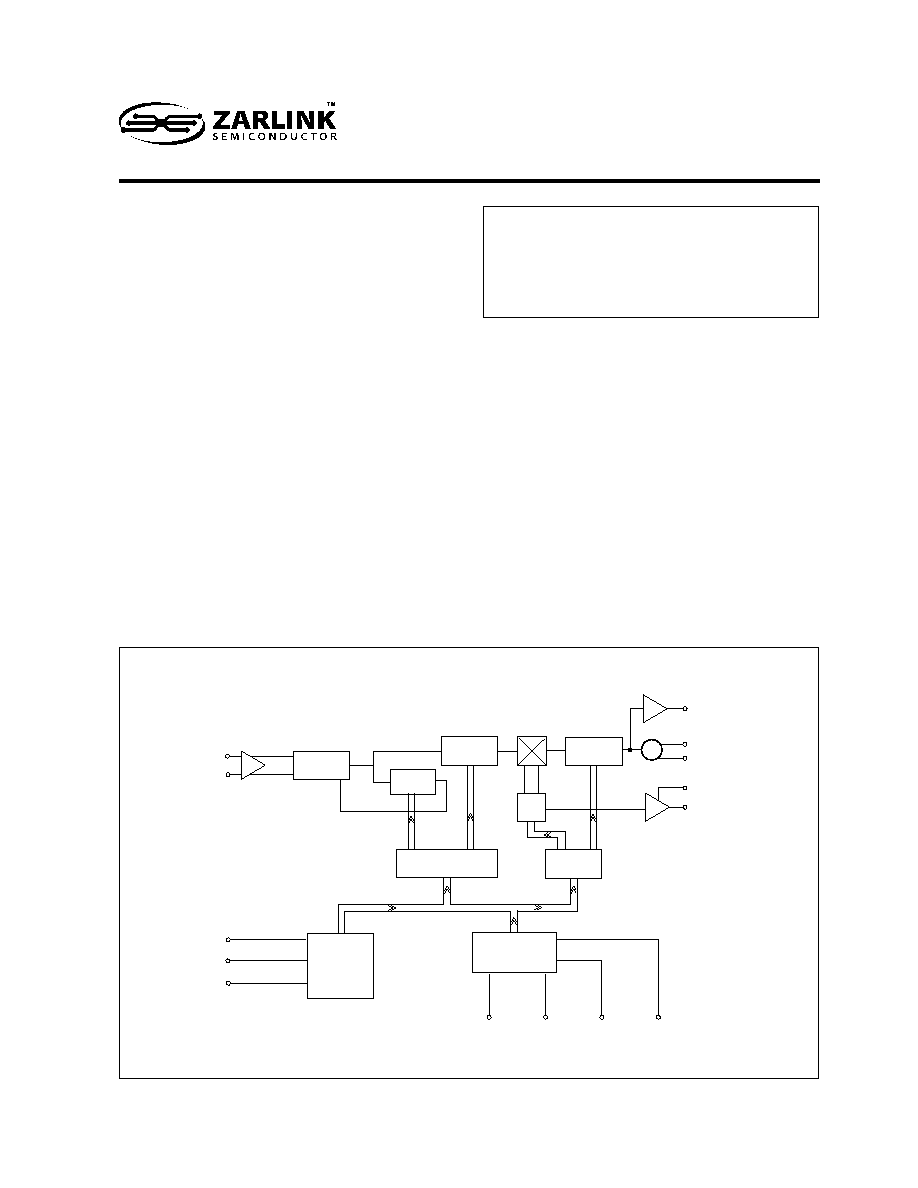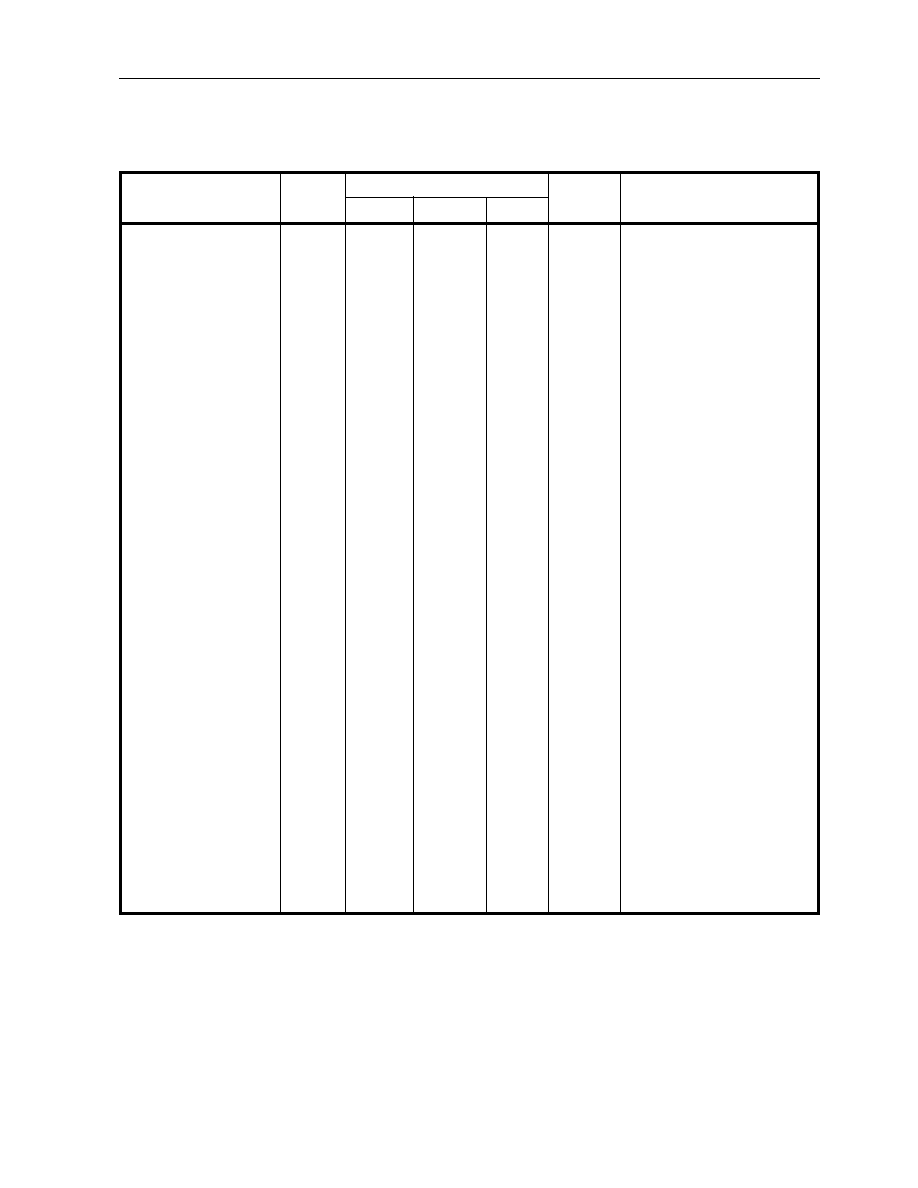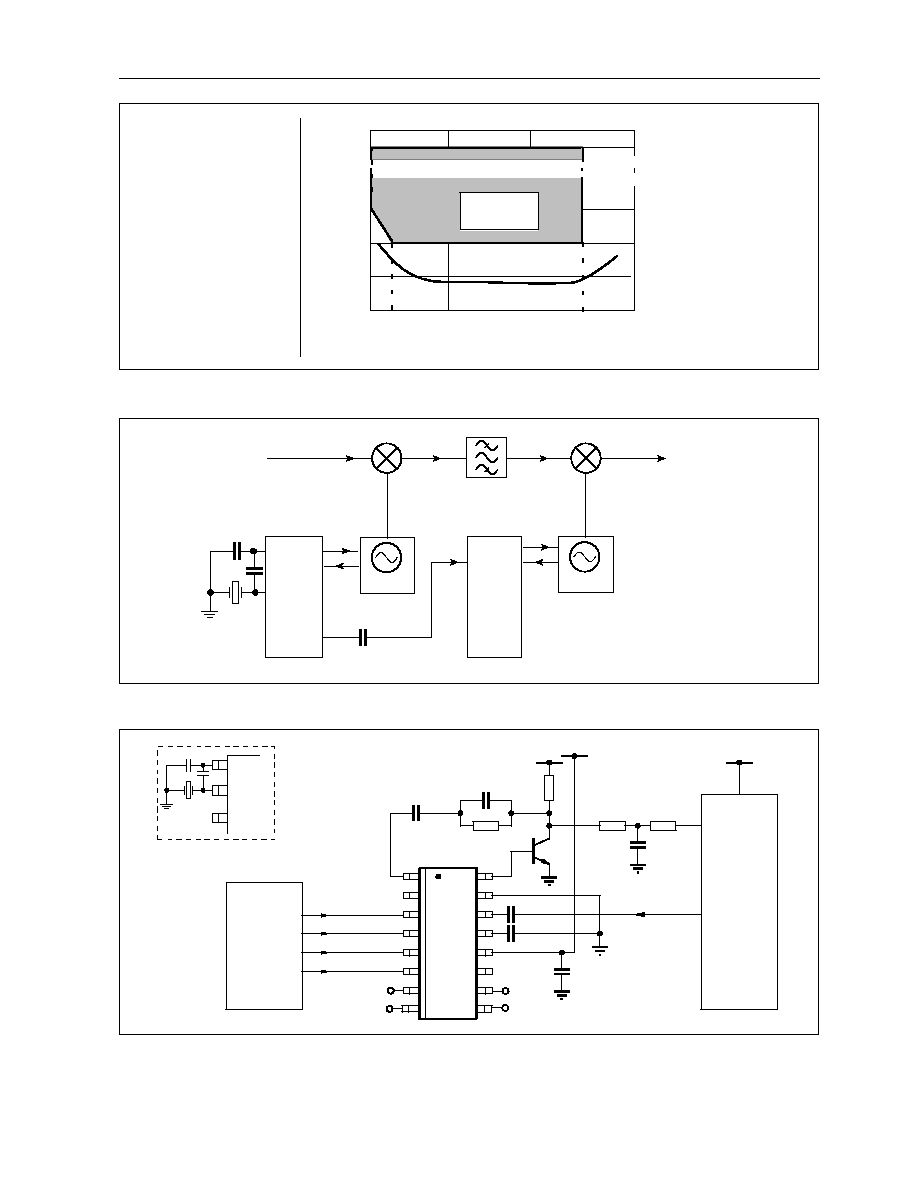
1
SP5768
Description
The SP5768 is a single chip frequency synthesiser
designed for tuning systems up to 3.0GHz and is
optimized for low phase noise with comparison
frequencies up to 4 MHz.
The RF programmable divider contains a front end dual
modulus 16/17 functioning over the full operating range
and allows for coarse tuning in the upconverter
application and fine tuning in the downconverter.
Comparison frequencies are obtained either from a
crystal controlled on-chip oscillator or from an external
source. A buffered reference frequency output is also
available to drive a second SP5768.
The device also contains 4 switching ports.
Features
∑
Complete 3.0GHz single chip system
∑
Optimised for low phase noise, with comparison
frequencies up to 4 MHz
∑
No RF prescaler
∑ Selectable reference division ratio
∑
Reference frequency output
∑
Selectable charge pump current
∑
Integrated loop amplifier
∑
Four switching ports
∑
Low power replacement for SP5658 and 5668
∑
Downwards software compatible with SP5658
∑
ESD protection, (Normal ESD handling
procedures should be observed)
Applications
∑
TV, VCR and Cable tuning systems
∑
Communications systems
Figure 1 - SP5768 block diagram
PORT P1/OC
RF INPUT
16/17
13 BIT
COUNT
4 BIT
COUNT
REFERENCE
DIVIDER
REF
CRYSTAL
CHARGE PUMP
DRIVE
17 BIT LATCH
6 BIT LATCH
DATA
CLOCK
ENABLE
DATA
INTERFACE
5 BIT
LATCH & PORT/
TEST MODE
INTERFACE
PORT P0/OP
PORT P2
PORT P3
CRYSTAL CAP
SP5768
3.0 GHz Low Phase Noise Frequency Synthesiser
November 2004
Ordering Information
SP5768/KG/MP1S (Tubes)
SP5768/KG/MP1T (Tape and Reel)
Zarlink Semiconductor Inc.
Zarlink, ZL and the Zarlink Semiconductor logo are trademarks of Zarlink Semiconductor Inc.
Copyright 2001-2004, Zarlink Semiconductor Inc. All Rights Reserved.

2
SP5768
Figure 2 - Pin Connections Diagram
MP16
QP16
CHARGE PUMP
CRYSTAL CAP
CRYSTAL
ENABLE
DATA
CLOCK
PORT P1/OC
PORT P2
DRIVE
V
EE
RF INPUT
RF INPUT
V
CC
REF
PORT P0/OP
PORT P3
16
SPOT
REF
.
Electrical Characteristics
These characteristics are guaranteed by either production test or design. They apply within the specified ambient
temperature and supply voltage unless otherwise stated. T
AMB
= -40
∞
C to 80
∞
C, V
CC
= +4∑5V to +5∑5V
Characteristic
Pin
Value
Units
Conditions
Min
Typ
Max
Supply current
12
18
25
mA
RF input frequency range
13,14
100
3000
MHz
RF input voltage
13,14
100
300
mV rms
100 - 200MHz
13, 14
30
300
mVrms
See Figure 6
RF input impedance
13,14
See Figure 3
Data, clock & enable
5,6,4
input high voltage
3
Vcc
V
input low voltage
0
0.7
V
input current
-10
10
µ
A
All input conditions
hysterysis
0.8
V
Clock rate
6
500
kHz
Bus timing -
5,6,4
data set up
300
ns
data hold
600
ns
enable set up
300
ns
enable hold
600
ns
clock to enable
300
ns

3
SP5768
Electrical Characteristics (continued)
These characteristics are guaranteed by either production test or design. They apply within the specified ambient
temperature and supply voltage unless otherwise stated. Tamb = -40
∞
C to 80
∞
C, Vcc = +4∑5V to +5∑5V
Characteristic
Pin
Value
Units
Conditions
Min
Typ
Max
Charge pump output
1
See Table 1
current
Vpin1 = 2V
Charge pump output
1
±
3
±
10
nA
Vpin1=2V, Vcc = +5.0V,
leakage
Tamb = 25
∞
C
Charge pump drive
16
0.5
mA
Vpin 16=0.7V
output current
Crystal frequency
2,3
2
20
MHz
See Figure 5 for application
External reference input
3
2
20
MHz
Sinewave coupled through
frequency
10F blocking capacitor
External reference drive
3
0.2
0.5
Vpp
Sinewave coupled through
level
10nF blocking capacitor
Buffered reference
11
AC coupled, See note 1
frequency output
output amplitude
0.35
Vpp
2-20MHz
output impedance
250
Comparison frequency
4
MHz
Equivalent phase noise
-148
dBc/Hz
At 10 kHz, SSB, with 2 MHz
at phase detector
comparison from 4 MHz
crystal reference
RF division ratio
240
131071
Reference division ratio
2
320
See Table 2
Output ports P0-P3
7,8,9,10
See Note 2
sink current
2
mA
Vport = 0.7V
leakage current
10
µ
A
Vport = Vcc
1
Reference output disabled by connecting to Vcc if not required
2
Output ports high impedance on power up, with data, clock and enable at logic 0

4
SP5768
Absolute Maximum Ratings
All voltages are referred to Vee at 0V
Characteristic
Pin
Min
Typ
Max
Units
Conditions
Supply voltage, Vcc
12
-0.3
7
V
RF input voltage
13,14
2.5
Vp-p
Differential
RF input DC offset
13,14
-0.3
Vcc+0.3
V
Port voltage
7,8,9,10
-0.3
Vcc+0.3
V
Charge pump DC offset
1
-0.3
Vcc+0.3
V
Varactor drive DC offset
16
-0.3
Vcc+0.3
V
Crystal DC offset
2,3
-0.3
Vcc+0.3
V
Buffered ref output
11
-0.3
Vcc+0.3
V
Data, clock & enable
5,6,4
-0.3
Vcc+0.3
V
DC offset
Storage temperature
-55
+125
∞
C
Junction temperature
+150
∞
C
MP16 thermal resistance,
chip to ambient
80
∞
C/W
chip to case
20
∞
C/W
Power consumption at
138
mW
All ports off
Vcc=5.5V
ESD protection
2
kV
Mil-std 883B latest revision
method 3015 cat.1.
Functional description
The SP5768 contains all the elements necessary, with
the exception of a frequency reference, loop filter and
external high voltage transistor, to control a varicap
tuned local oscillator, so forming a complete PLL
frequency synthesised source. The device allows for
operation with a high comparison frequency and is
fabricated in high speed logic, which enables the
generation of a loop with excellent phase noise
performance, even with high comparison frequencies.
The package and pin allocation is shown in Figure 1 and
the block diagram in Figure 2.
The SP5768 is controlled by a standard 3-wire bus
comprising data, clock and enable inputs. The
programming word contains 28 bits, four of which are
used for port selection, 17 to set the programmable
divider ratio, four bits to select the reference division
ratio, bits RD & R0-R2, see Table 2, two bits to set
charge pump current, bit C0 and C1, see Table 1, and
the remaining bit to access test modes, bit T0, see
Table 3. The programming format is shown in Figure 4.
The clock input is disabled by an enable low signal, data
is therefore only loaded into the internal shift registers
during an enable high and is clocked into the controlling
buffers by an enable high to low transition. This load is
also synchronised with the programmable divider so
giving smooth fine tuning.
The RF signal is fed to an internal preamplifier, which
provides gain and reverse isolation from the divider
signals. The output of the preamplifier is fed to the 17 bit
fully programmable counter, which is of MN+A
architecture. The M counter is 13 bit and the A counter
4
The output of the programmable counter is fed to the
phase comparator where it is compared in both phase
and frequency domain with the comparison frequency.
This frequency is derived either from the on board
crystal controlled oscillator or from an external reference
source. In both cases the reference frequency is divided
down to the comparison frequency by the reference
divider which is programmable into1 of 16 ratios as
descried in Table 2.
The output of the phase detector feeds the charge
pump and loop amplifier section, which when used with
an external high voltage transistor and loop filter
integrates the current pulses into the varactor line
voltage. The charge pump current setting is described
in Table 1,
A buffered crystal reference frequency suitable for
driving further synthesisers is available from Pin 11. If
not required this output can be disabled by connecting
to Vcc
The programmable divider output divided by 2, Fpd/2
and comparison frequency, Fcomp can be switched to
ports P0 and P1 respectively by switching the device
into test mode. The test modes are described in Table
3.

5
SP5768
Figure 3 - RF input impedance
Table 1 - Charge pump current
Figure 4 - Data format
S
11
:
Zo
= 50
Normalised to 50
Frequency Markers at 500MHz,
1GHz, 1.5GHz and 2.4GHz
-j1
2
1
3
4
+j0.2
+j0.5
+j1
+j2
+j5
-j5
-j2
-j0.5
-j0.2
0
Frequency data
P1
P0
T0
C1
C0
R2
R1
R0
RD
MSB
LSB
2
25
2
0
2
24
2
23
2
22
2
21
2
20
2
19
2
18
2
17
2
16
2
26
2
27
P2
P3
2^16 to 2^0
:
Programmable divider ratio control bits
R2,R1,R0
:
Reference divider control bits
RD
:
Reference divider mode select
P3, P2, P1,P0
:
Port control bits
C1,C0
:
Charge pump current select
T0
:
Test mode enable
DATA
CLOCK
ENABLE
C1
C0
Current (in
µ
A)
0
0
230
0
1
1000
1
0
115
1
1
500

6
SP5768
Figure 5 - Crystal oscillator application
Table 2 - Reference division ratio
Table 3 - Test modes
2
3
SP5768
39pF
18pF
RD
R2
R1
R0
RATIO
0
0
0
0
2
0
0
0
1
4
0
0
1
0
8
0
0
1
1
16
0
1
0
0
32
0
1
0
1
64
0
1
1
0
128
0
1
1
1
256
1
0
0
0
3
1
0
0
1
5
1
0
1
0
10
1
0
1
1
20
1
1
0
0
40
1
1
0
1
80
1
1
1
0
160
1
1
1
1
320
P1
P0
T0
FUNCTIONAL DESCRIPTION
X
X
0
Normal operation
0
0
1
Charge pump sink
0
1
1
Charge pump source
1
0
1
Charge pump disable
1
1
1
Port P1 = Fcomp, P0 = Fpd/2
X = don't care

7
SP5768
Figure 6 - Typical input sensitivity
1000
3000
FREQUENCY (MHz)
200
OPERATING
WINDOW
300
100
30
10
VIN
(mV RMS
INTO 50
)
100
Figure 7 - Example of double conversion from VHF/UHF frequencies to TV IF
CONTROL
MICRO
2n2
68pF
+30V
+5V
22k
1k
OR
+12V
4n7
BCW31
1n
1n
10n
P1
TUNER
OSCILLATOR
OUTPUT
SP5768
13k3
P0
CLOCK
DATA
ENABLE
Optional application utilising
on≠board crystal controlled
oscillator
1
12
2
3
4
5
6
7
11
10
9
8
13
14
4MHz
18pF
2
3
39pF
REFERENCE
P3
P2
15
16
Figure 8 - Typical application SP5768
VCO
VCO
10nF
50 - 900MHz
38.9MHz
1650-2700MHz
2
3
10
3
SP5748
SP5748
1.6GHz
1650 -2400MHz
11
SP5768
SP5768

8
SP5768
Application Notes
A generic set of application notes AN168 for designing
withsynthesisers such as the SP5768 has been written.
This covers aspects such as loop filter design and
decoupling. This application note is also featured in the
Media Data Book, or refer to the Zarlink Semiconductor
Internet Site http://www.zarlink.com.
Loop Bandwidth
The majority of applications for which the SP5768 is
intended require a loop filter bandwidth of between
2kHz and10kHz.
Typically the VCO phase noise will be specified at both
1kHz and10kHz offset. It is common practice to arrange
the loop filter bandwidth such that the 1kHz figure lies
within the loop bandwidth. Thus the phase noise
depends on the synthesiser comparator noise floor,
rather than the VCO.
The 10kHz offset figure should depend on the VCO
providing the loop is designed correctly, and is not
underdamped.
Reference Source
The SP5768 offers optimal LO phase noise
performance when operated with a large step size. This
is due to the fact that the LO phase noise within the loop
bandwidth is:
phase comparator
LO frequency
noise floor
+ 20 log
10
phase comparator frequency
Assuming the phase comparator noise floor is flat
irrespective of sampling frequency, this means that the
best performance will be achieved when the overall LO
to phase comparator division ratio is a minimum.
There are two ways of achieving a higher phase
comparator sampling frequency:≠
A) Reduce the division ratio between the reference
source and the phase comparator
B) use a higher reference source frequency.
Approach B) may be preferred for best performance
since it is possible that the noise floor of the reference
oscillator may degrade the phase comparator
performance if the reference division ratio is very small.
(
)

9
SP5768
Reference oscillator
Output Ports
PORT
V
REF
500
500
RF INPUTS
Reference output
V
CC
REF
1.2mA
V
CC
BIAS
25K
V
CC
CHARGE
PUMP
DRIVE
200
CRYSTAL
V
CC
CRYSTAL
CAP
RF inputs
Loop amplifier
Disable, Enable, Data and Clock inputs
INPUT
Figure 9 - Input/Output interface circuits

www.zarlink.com
Information relating to products and services furnished herein by Zarlink Semiconductor Inc. or its subsidiaries (collectively "Zarlink") is believed to be reliable.
However, Zarlink assumes no liability for errors that may appear in this publication, or for liability otherwise arising from the application or use of any such
information, product or service or for any infringement of patents or other intellectual property rights owned by third parties which may result from such application or
use. Neither the supply of such information or purchase of product or service conveys any license, either express or implied, under patents or other intellectual
property rights owned by Zarlink or licensed from third parties by Zarlink, whatsoever. Purchasers of products are also hereby notified that the use of product in
certain ways or in combination with Zarlink, or non-Zarlink furnished goods or services may infringe patents or other intellectual property rights owned by Zarlink.
This publication is issued to provide information only and (unless agreed by Zarlink in writing) may not be used, applied or reproduced for any purpose nor form part
of any order or contract nor to be regarded as a representation relating to the products or services concerned. The products, their specifications, services and other
information appearing in this publication are subject to change by Zarlink without notice. No warranty or guarantee express or implied is made regarding the
capability, performance or suitability of any product or service. Information concerning possible methods of use is provided as a guide only and does not constitute
any guarantee that such methods of use will be satisfactory in a specific piece of equipment. It is the user's responsibility to fully determine the performance and
suitability of any equipment using such information and to ensure that any publication or data used is up to date and has not been superseded. Manufacturing does
not necessarily include testing of all functions or parameters. These products are not suitable for use in any medical products whose failure to perform may result in
significant injury or death to the user. All products and materials are sold and services provided subject to Zarlink's conditions of sale which are available on request.
Purchase of Zarlink's I
2
C components conveys a licence under the Philips I
2
C Patent rights to use these components in and I
2
C System, provided that the system
conforms to the I
2
C Standard Specification as defined by Philips.
Zarlink, ZL and the Zarlink Semiconductor logo are trademarks of Zarlink Semiconductor Inc.
Copyright Zarlink Semiconductor Inc. All Rights Reserved.
TECHNICAL DOCUMENTATION - NOT FOR RESALE
For more information about all Zarlink products
visit our Web Site at









